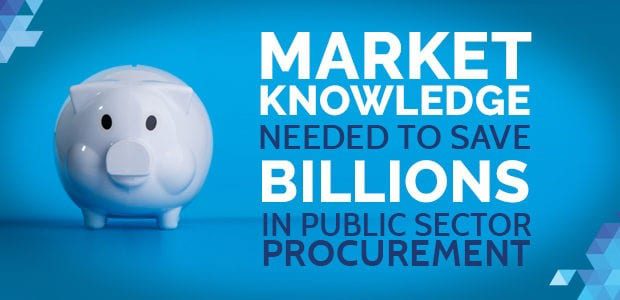On the ‘What We Do’ section of their Home page, the CCS state: “The Crown Commercial Service (CCS) brings together policy, advice and direct buying; providing commercial services to the public sector and saving money for the taxpayer.” Saving money for the taxpayer. So when the Chief Executive of the CCS says that not enough has been done to protect taxpayers’ money (I’m paraphrasing there of course) then, as taxpayers, we should all sit up and take notice.
In a rare insight into the workings of her organisation, CCS CEO Sally Collier told an audience of leaders from across government and industry at The Public Sector Show last month that improvements needed to be made. It seems there is a skills shortage at the CCS, and with the benefit of an injection of commercial expertise and market knowledge it may be possible to save up to 30% through improved procurement and supplier innovation and management. Essentially, Collier is suggesting that there is currently an imbalance in the talent force that needs to be addressed, and this is costing us taxpayers a small fortune. As total government spending on goods and services is around the £230bn mark, apparently just shy of £70bn is there for the saving!
While this may seem a little on the optimistic side, Collier does offer us some hope for a more thrifty service because she believes that working for the CCS has become a ‘sexier’ prospect (my word, not hers) in recent years. She believes that her department now has the status to attract high-flying talent that previously would have been lost to the diplomatic service.
Interestingly she said: “I accept we may not be an intelligent client, but we are getting better at being an intelligent client.” And this shows an alignment with our own thinking.
In dealing with hundreds of strategic relationships, we have witnessed behaviours that logically should work to drive better value and those that you would think should not. Evidence of what actually works, however, suggests that logic doesn’t always win out and it is hard-won experience that drives the best results. Often, what appears logical doesn’t work in practice for a whole host of reasons.
The question raised by Collier about being an ‘Intelligent Client’ is an important one. Structuring an intelligent client function to drive maximum value in a strategic relationship rather than being the project’s police officers, looking for and remedying misdemeanours, is a crucial difference. And the role of an ICF team is often misunderstood because organisations that are new in this space aren’t usually clear on ‘what good looks like’ for their own intelligent client function, what objectives it is supposed to have, and how it will achieve them.
Some of the key aspects of a really strong intelligent client function are:
1. Operations
Team members must have knowledge of, or have the capacity to appreciate, all operational aspects of the service or department that is to be outsourced. They do not necessarily need to come from an HR, Finance, ICT role, etc., but a deep understanding of the needs of the service or department is important so that they can both fully research and quantify expectations and communicate at the same level as their supplier-side counterparts. The latter is especially important to ensure the client can ‘critical-friend challenge’ proposals from the vendor to ensure you reduce the possibility of miscommunication and/or misunderstanding.
2. Business Outcomes
What are the business outcomes you are hoping to achieve as a result of your outsourced relationship? As mentioned in ‘Operations’ above, knowledge of how things work is essential to determine where you are looking to get to, or ‘what good looks like’. This requires an ability to develop quantifiable goals and milestones to help guide vendors. Without a clear (and internally agreed) picture of the outcomes you are looking to achieve, your ICF team will be flying blind and won’t be able to effectively innovate with the vendor.
3. Written Contracts
Your ICF team members must have the ability to read and understand contracts without the need of a solicitor or barrister to interpret them. If they cannot, then it is less likely to be the competence of the ICF team in question, and more likely to be the lack of competence of the legal team to draft a contract that works from an operational and business outcomes perspective.
Contracts must contain all of the elements that will be required to adequately and effectively manage the relationship in order to drive the right business outcomes, not just penalise the vendor for doing something incorrectly. As we mentioned in a previous article, “defensive contracts drive defensive behaviours”.
Experience (and evidence) dictates that if you have an appropriately resourced ICF team in place prior to the award of the contract with your vendor (ideally, they should have been involved from the beginning of drafting your business outcomes), this team can work with your legal team to draft an ‘operational contract’. This will ensure that the contract will drive the right behaviours between both you and your vendor to ensure maximum value for you as the client and a fair and equitable profit and cash flow for the vendor.
In this respect, the ICF team will be ultimately responsible for determining whether the language used in the contract is clear and unambiguous and relevant to the audience it is looking to communicate with. Lack of clarity or alignment with the business outcomes leaves contracts open to interpretation, increasing the risk of issues in the future.
So, the contract needs to be a clear and complete representation of what outcomes you expect from the project, and the framework of how you would like to be kept informed of progress, along, preferably, with a built-in biannual contract review and outcomes reshaping requirement.
4. Vendor ‘Expert Responsibilities’
Vendors have an implied legal duty to inform their clients honestly and frankly as to what they can and cannot do, and the consequences on your business outcomes of what they are unlikely to be able to achieve.
They need to ensure that all of their representations, both pre-written contract and post, are clear and accurate, and that if the client’s expectations are beyond their capability or capacity that they inform them of this and where the shortfall is.
Skilled ICF team members must be able to merge real-world expert responsibilities and representations with the analytical world of written contracts in order to recognise where conflicts may occur.
5. Behaviours
Recent case law evidences that behaviours of both parties on the ground in running/operating outsourced service delivery often takes precedence over the written contract terms.
Therefore, not only does your ICF team need to recognise behaviour on both client and vendor side that could impact upon their contractual obligations, but to notice when behaviours are representative of other issues in the making.
Client-side behaviour that could be seen as restricting a vendor in some way must be stopped, as this could weaken their case should the relationship not result in agreed outcomes and legal recourse is sought.
Vendor-side behaviour that impacts on productivity must not be allowed to continue, and behaviour that suggests a loss of focus or other background issues must be investigated and to ensure that you are forewarned against further tail-off or the collapse of the relationship.
6. Sector Legislation
We’re not suggesting that you need to look for legal experts, but a good working understanding of all relevant legislation such as EU procurement regulations in the public sector; and in the private sector, FSA regulations if you are in the finance sector for example. Regulations are, as we all know, very complex; determining the right way of approaching them will impact your ability to find the right vendor for the project and on the probability of its success.
7. Change Management
Change management skills will impact on your ICF team’s ability to coordinate the million-and-one objectives that need to be managed and that could go wrong if not performance managed when outsourcing complex services. Not only will team members need to be excellent people managers, able to get buy-in from all relevant stakeholders in order to have them pulling in the same direction, but they must have a clear and concise process for structuring and enabling the change process. Experience is imperative here, as no amount of theory is an adequate substitute for good old-fashioned practical appreciation of the complexities of change management.
8. Commercial Trust
Implied in ‘Management’ above, your team members need to have a natural ability to engender commercial trust in others. They must have the character and charisma to evidence this to others through their behaviour, their expertise, their position and their knowledge in this area. One of the primary roles of an ICF team member is to maintain a close working relationship with their counterparts on the partner’s side – to stay informed of any issues relating to the organisation of the service delivery outcomes, and to be a trusted confidant at all times. The ability to win and maintain trust, and at times, regain that trust, is essential. There is a 5-step process outlined in our paper ‘8 Steps to Improve Performance, Rebuild Trust and Drive Maximum Value’ on pages 18-31. The paper is free of charge to readers of this article.
For the CCS to be interested in building its ICF capability, to be able to drive cost-savings through greater efficiency and knowledge and better practices in procurement, end-to-end cost management and help drive better service outcomes across the public sector, is very encouraging. It’s a positive way forward that will no doubt see not only the CCS become a more desirable place to work, as Collier suggested, but also that public sector/private sector relationships become even more desirable to a wider range of competitive and skilled private sector organisations.



